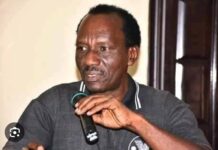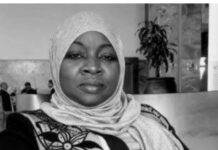
Email: ochima495@gmail.com
SMS: 08055001912
It should be possible for the rest of us to understand the frustrations of Ndigbo in the hands of their two big brother tribes, Hausa/Fulani and Yoruba, and their determination to distance Ndigbo from the levers of the highest political power in the land. We should offer them some sympathy in their quest at every election circle to produce the next president of the Federal Republic of Nigeria. They have not produced one since the late Owelle of Onitsha, the great Dr Nnamdi Azikiwe, became president, commander-in-chief of the armed forces under the provisions of the republican constitution in 1963. It has been a long time for them to sit and watch the other two big tribes chop power only for Ndigbo to smell it. Think of a sizzling Texas sirloin steak.
Ndigbo usually serve notice at each election circle that it is their turn to replace the incumbent in Aso Rock. Indeed so; except it never happens because it is beyond Amadioha. With the current political calculations and permutations going on to determine which of the three tribes produces the next president in 2023, Ndigbo, undeterred, are pushing their case, pleading with their big brothers tribes to be fair and just. I offer my sympathy and support.
I believe their quest is fully backed by the historical founding of the Nigerian federation. The British colonial authorities constructed the new nation in 1914 on the majority ethnic tripod – Hausa/Fulani, Igbo and Yoruba. They thus created the impression that these three tribes would be the rulers in a system of musical chairs. The rest of the tribes, known as the minorities, are to serve their great masters by obediently hewing the wood and drawing the water. It has been in obedience to this historical fact that the minorities have never asked for their turn to produce the next president at any time. They were put in their place by the British and their local successors.
The rules of the assumed musical chairs are observed in a manner that gives fairness a bad rap. Blame the north, for which read, Hausa/Fulani. Because power, political power, is so sweet, the north, using its numbers is minded to hoard it and treat the south, made up of the East and the West, as a junior partner in the power project. Crumbs are thrown to them and they easily lap them up, satisfied that the crumbs of power give power too, as in half bread may not fill the stomach but it would not leave it empty. The north carries either the east or the west along as it suits its political interests and convenience.
Thanks to Chief Olusegun Obasanjo, the minorities made a break-through with the election of President Goodluck Jonathan in 2011. But the north smarted and, believing that a four-year absence of power from the region was dangerously too long for them, fought to return power to the region that believes that its right to hold on to power is a divine right conferred by the numbers it obtains at the population census. They would not let Jonathan stake his claim to a second term in office. Power returned to the region with the election of Muhammadu Buhari in 2015. The fear that this would persist in the land far into the future led the Yoruba to start the agitation for restructuring the country or a new political arrangement under the supreme law of the land to give the six geo-political zones some measure of self-determination in the context of best practices in federalism. Done right, it would also make all of us equal power holders and equal power givers.
In previous dispensations, there was some sense of power balance between the north and the south under both civilian and military regimes. When the number one came from the north, number two came from the south, and vice versa, with the exception being the Buhari military regime, 1984-85 when the north held both slots. The balance gives each side hope of benefitting from a logical succession plan. This has so far been more of hope than political reality. No vice-president has yet succeeded his principal.
Ndigbo are right to insist on their right to produce the next president in 2023. Their two big brothers have carried political unfairness to the next level. Ndigbo have not produced a vice-president since the second republic when the late Alex Ekwueme made Ndigbo relevant partners in our national power project. Under the Obasanjo administration, Ndigbo were given the number three slot, the senate presidency; and being fair-minded democrats who believe in you-chop-I-chop politics of rights, each of the five Igbo states produced a senate president in eight years.
Things appear to be going downhill for them. They are nowhere in the defined succession equation today. In the present dispensation, power is shared between the north and the west. The north produced the president and the senate president; the west produced the vice-president and the speaker, House of Representatives. Thus, with power firmly in their hands, it would seem like a pious but forlorn hope for Ndigbo to expect their fellow big brothers to cede power to them in 2023. Politics has neither justice nor fairness wired into its DNA.
Let me raw our attention to some fundamental facts about the peculiar nature of the ethnic-based political leadership recruitment process that has made it impossible for a new crop of leadership to emerge at all levels in the country.
The first is that the south has pampered the north beyond reasonableness. The north dictates to the rest of the country. It believes that all other tribes, big and small, hold power as a mark of its own generosity, and not as a constitutional right. Its assumed right to always produce the president is neither a constitutional right nor a moral imperative. So long as the south refuses to challenge this privileged position of the north, so long will they continue to play the second fiddle and even be marginalised. This stranglehold on power must be broken to free the energy of all Nigerians to produce a dynamic leader who would take on the task of rebuilding a nation that has become the pathetic victim of power for its own sake.
Secondly, something is missing in the political calculations of Ndigbo. As I see it, they have no political platform on which to stand to bargain or assert their right in the national power project. Politics thrives on bargaining. Groups that have no chips to bargain with are quite often ignored without any qualms. The Yoruba, thanks to Senator Bola Tinubu, succeeded in remaining in the mainstream because they had such a platform and they stood on it to bargain with the north when Buhari went to them in 2014 in his fourth quest to become president. Both sides bargained from positions of relative strength and arrived at the formation of a new political party, APC, that became an instant political sensation – and dislodged PDP.
On the other hand, Ndigbo ditched what should have been their political platform, UPGA. They briefly stood their ground in the 2015 general elections that produced Buhari. But soon enough, they trooped to the new party in keeping with the principles of political opportunism, seeking crumbs from the master’s table as individuals. It did not save them from being thrown into the political Siberia as a punitive measure by a president who is intolerant of political pluralism for daring to decide for themselves. If it comes to bargaining in the power equation, on what platform would Ndigbo stand to bargain and what would be their bargaining chips?
The answer may lie with Peter Obi, the presidential candidate of the Labour Party. If the current crowd of young people he pulls provide the basis for an informed reading of the swing of the political pendulum, he may likely appropriate the party as a credible Ndigbo political platform. He is so far the most serious and credible Igbo man who takes his quest for president seriously. I had expected his people to rally round him and say of him, to borrow from Obasanjo, as the northerners do, namu, namu.
But while young Igbo and young people from other tribes are enthused by his emergence as a presidential candidate and rally round him, some prominent Igbo politicians treat him as a huge joke; something of a Charlie-Charlie on the national political stage. They dismiss his quest in prose that shocks me. I think this is a huge mistake. Obi may or may not replace Buhari in Aso Rock next year but he could carve a new path to the emergence of a third force in our national politics and help to expand the frontiers of our political pluralism.
Truth be told, Ndigbo have failed to parley their business acumen into political wisdom. It is time for them to own their own blame. (First published on August 26, 2020, titled Ndigbo and the quest for 2023. Republished with a new headline and some slight editing and additions).



